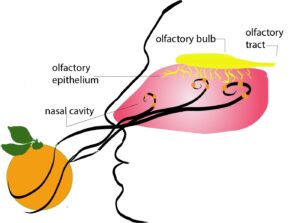Have you ever wondered how smell works? How do we distinguish what smells good or bad? If so, then you are in luck because in this article I will describe how we smell and what makes flowers smell so good and other odors like rotting food rancid.
How do you smell?
To understand why something smells good or bad, we have to understand how we smell. Our sense of smell is a chemosensory system meaning it can detect chemicals. This is important because odor is created when a substance releases molecules into the air. To illustrate this lets imagine smelling a freshly cut orange. The freshly cut orange makes contact with the air and becomes vaporized. You breath in these ‘vaporized’ orange particles. and the air passes through your nose and nasal cavity. In the nasal cavity, you have the olfactory epithelium, which is covered in mucus. The mucus causes some of the orange molecules to stick to your olfactory epithelium, which is covered with olfactory receptor neurons. Olfactory receptor neurons are specialized cell neurons that detect smell by binding specific molecular regions, in this case molecular regions on the orange molecules.

Each olfactory receptor neuron has one odor receptor and recognizes one molecular region. An odor molecule can bind many receptors. Which receptor an odor binds is like a code to your brain allowing you to recognize what an odor is. This code is very specific and allows you to detect faint differences in smell. For instance, a green apple and red apple are only slightly different in smell but we can distinguish them because our brain receives a slightly different ‘odor code’ from our olfactory receptor neurons. For a long time, scientists thought humans had a weak olfactory system and believed we could only discern 10,000 smells. Recently, it was discovered that humans can distinguish over 1 trillion smells. Not bad at all if I say so myself.
What makes something smell good or bad?
Now we know that smells have to give off vapors in order for you to smell them. We also know that our smell is very acute, which is why the smell of a green apple might make you feel a certain way but a red apple can make you feel entirely different. But why do smells make us feel any emotions? How can a certain smell make you happy or sad? The best way to answer this question is in two parts:
Memory: The scent of something can often ‘teleport’ you into a memory or flood you with emotion. Often times you might not be sure why. Why is this the case? Smell is directly linked to memory in a way that other senses aren’t. When the olfactory receptor neurons bind a molecule they send a signal through the cranial nerve directly to the olfactory bulb in your brain. The olfactory bulb is part of the limbic system, which associates with the amygdala (your fight or flight processing center) and your hippocampus (your long-term memory processing center). This direct connection between memory/ emotion, and smell causes you to access these memories/ emotions quicker and have a less conscious tie between the smell and memory/ emotion. A great example of this is cleaning products. Companies that create cleaning products have taken advantage of this unconscious tie between smell and how you feel. A large portion of cleaning products smell like citrus. Now, as a society we associate a citrus smell with cleanliness, though there is no inherent cleanliness about an orange or lemon. Another key example is ‘sweet’ smelling food. Sugar is odorless. Over time we learn to associate the smell of cake or fruits as sweet. Most smells are not inherently good, soothing, or repulsive. Rather, smells can strongly associate with memories or emotions in the past that we aren’t even aware of causing us to like or detest a smell.
Instincts: Evolution also plays a major influence on the appeal of a smell. There is a reason everyone thinks rotten food smells bad. Rotten food is full of bacteria. As bacteria digest the food they give off many byproducts; a major one is hydrogen sulfide. Our sense of smell can detect hydrogen sulfide and have associated it with disgust. It is a sign to your body to avoid eating this potentially dangerous bacteria. The smell of blood has also been evolutionary repulsive to humans. A repulsion to blood is associated with prey animals, whereas predator animals are attracted to blood. Ancestors of modern humans were prey animals that primarily ate insects and plants. Modern humans are primarily predators, but some archaic instinctual sense of smells are still with us.
Smell is a unique sense. Though we might not be aware of it we have a lot of instinctual and memory-associated reasons for why a smell attracts you or repels you. Smell can cause you to feel a rush of emotions and not even know why. So next time you smell a flower maybe ask yourself why it makes you feel happy? Or just simply enjoy it.
Peer Editor: Arianna Cascone